VIVEK SANJIVANI: In the Educational Front
1. Vivek Sanjivani Website:
There are several salient features of our website which are: 1. Trilingual: The site is in English, Bangla and Hindi. 2. Online Examinations: The site provides opportunities for students and interested persons to take practice tests in different Science subjects, Mathematics and literatures on Sri Ramakrishna, Ma Sarada and Swami Vivekananda at various levels. 3. Video Lessons: Some edited videos of our online Science classes are available here. 4. Films on Value Education and Health Education: The links of several films developed by our department are provided here. 5. Viewing 360° Studio: Provides a panoramic views of different places.
2. Vivek Sanjivani Elibrary Website: RKM Library | E-Library | Vivek Sanjivani | E-Books | ই লাইব্রেরি
At present people are interested to read books or articles online or in the softcopy format. We have started Elibrary to fulfil the current need and to promote easy and fruitful reading with pleasure. The main features of this site are:
1. Reading of Authentic books: It provides an opportunity to read some valuable books on Sri Ramakrishna, Ma Sarada and Swami Vivekananda in an illustrated manner with more pictures and supporting information from latest research. 2. Cross references: Different books related to Sri Ramakrishna and Swamiji have been added with cross references to have easy reading, finding and research.
3. Vivek Sanjivani Online Class:
We try to provide quality and relevant secondary level education to rural children. During teaching-learning programs we follow the ‘Constructivism’ method which enables each learner to build their understanding in an individualistic way and to find different personal connection points of relevance in their learning. We have Online classes for various groups at secondary level. Our educational programmes emphasise on concept-based learning, trying to bridge social, regional and gender gaps and minimizing digital divide among the urban and rural children.
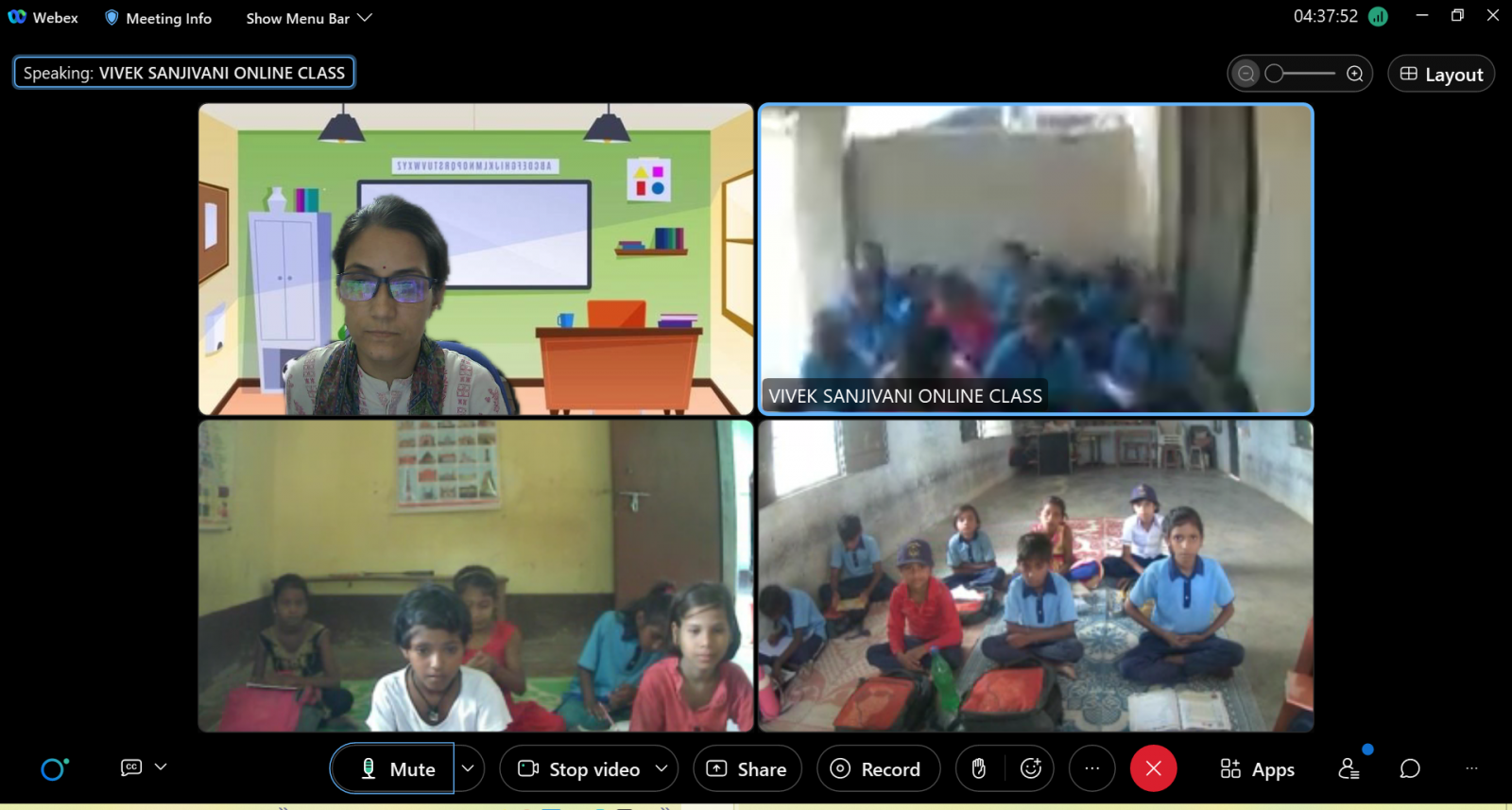
Online Classes in Rural Areas:
|
Online Classes in Rural Areas |
|||||
|
Class |
Subject |
No. of Session |
Boys |
Girls |
Total |
|
VI |
Science |
16 |
50 |
72 |
122 |
|
VII |
Communicative English |
19 |
107 |
198 |
305 |
|
|
Total |
35 |
157 |
270 |
427 |
On-site Computer Classes:
|
|
No. of Session |
Girls |
Total |
|
Varanasi |
36 |
311 |
482 |
|
Village |
20 |
171 |
4. “Shishu Tirth” (Non-formal Primary Educational Programme): Under this programme a total of 124 children of poor families of Rampur (Mirzapur), Lalganj (district Azamgarh) and Lohara (Sonbhadra) districts have been enrolled in our three child-friendly holistic non-formal Primary Educational Centres. 51 students of Classes II and III are learning onsite. 41 students of class IV and 32 students of class V are learning through Online class. These kids receive holistic education in their natural environment. They get healthcare support, nutritional snacks daily along with free learning and literacy materials, hygiene and sanitation items, uniforms and school bags for overall growth and development.
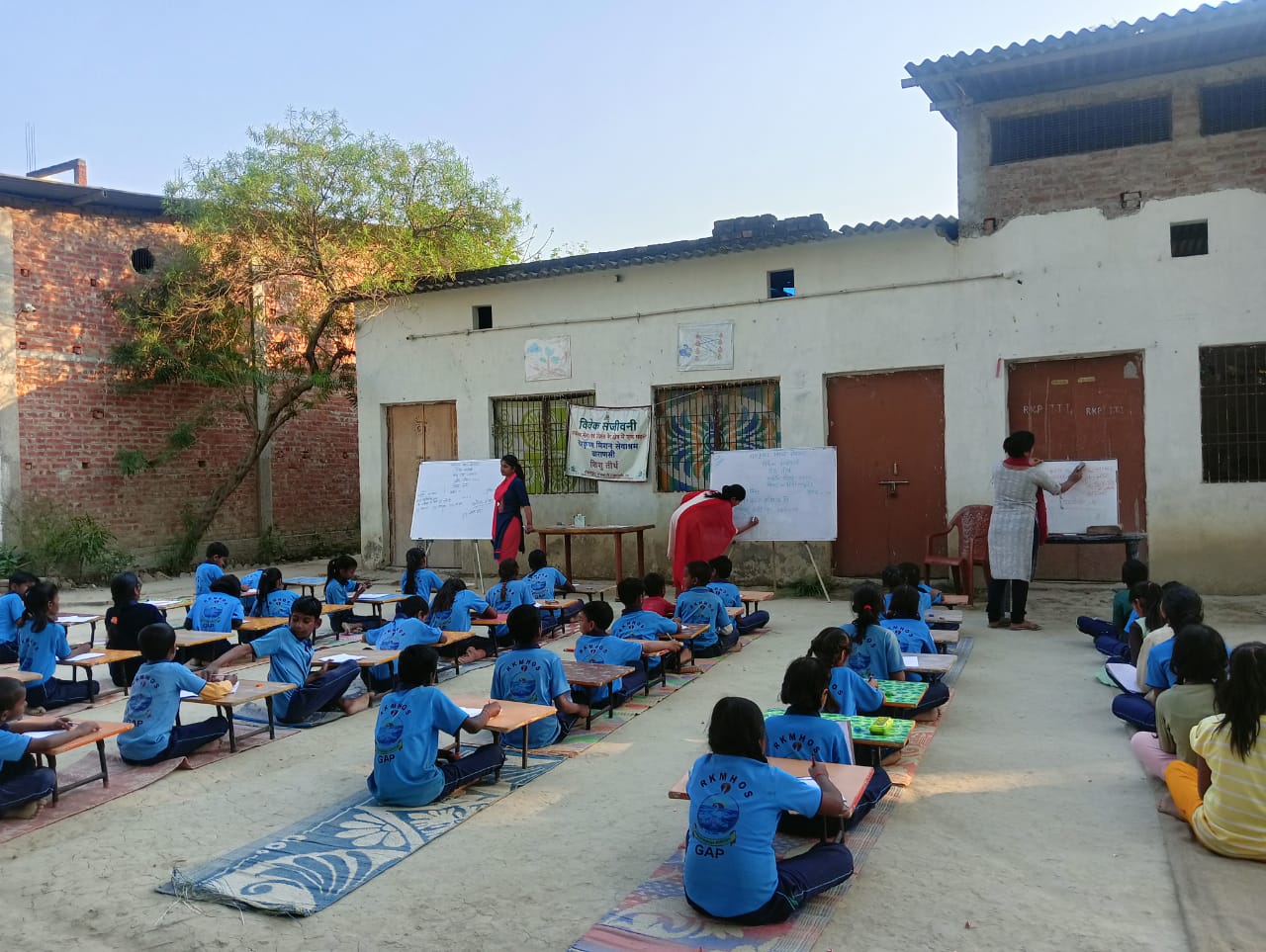
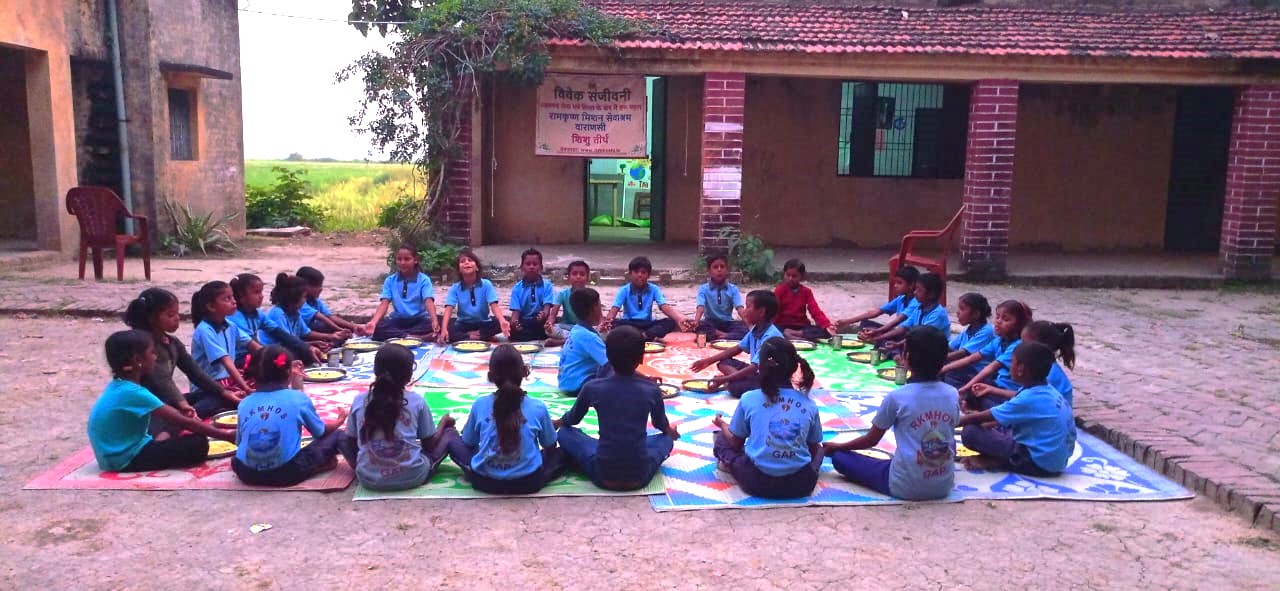
5. Parents-Teachers Meeting: This has been initiated to acquaint and inspire the parents to be the part of their children’s effective development and progress in all spheres of life. The parents should feel the necessity of their sincere participation to make their children self-reliant and in the process of nation building.
6. Inauguration of Films on Life and Teaching of Swami Vivekananda: We developed nine short Films in Hindi based on Life and Teachings of Swami Vivekananda. Five films were developed on Swamiji’s ever-jovial mood and humanistic attitude, and four films were developed on his patriotism. All the films are uploaded in the YouTube for public view: VIVEK SANJIVANI of RKMHOS, Varanasi - YouTube
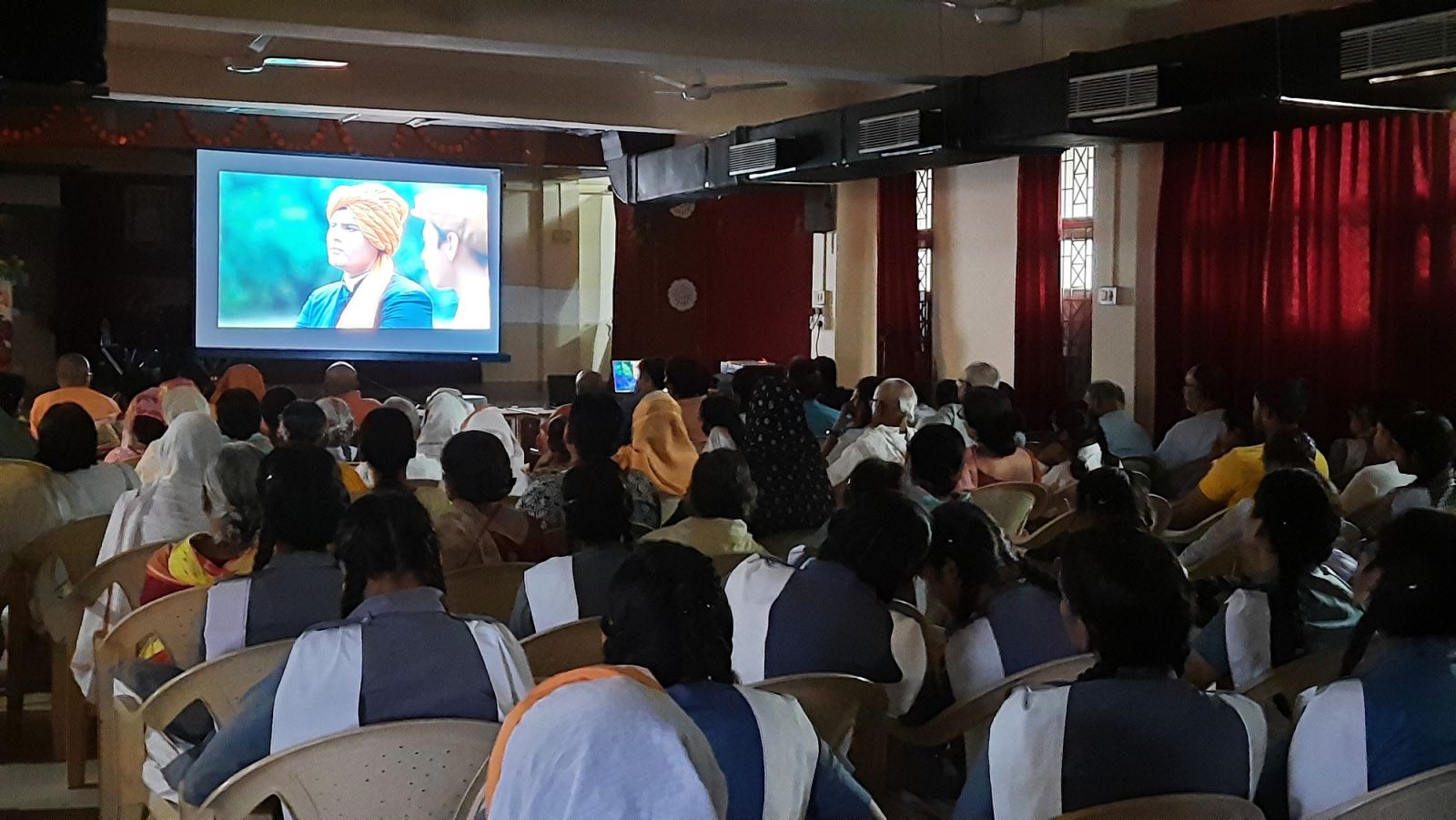
7. ‘जीवविज्ञान- दसवीं कक्षा’: Publication of a concept-based Biology book for Class X in Hindi as a Foundation Course for NEET:
Vivek Sanjivani has published a biology book for Class X of International standard in Hindi as a NEET-foundation course to build students’ science concepts with an integrated approach to various subjects the students learn at the secondary level. This book is also tool for the teachers at secondary level in the following way:
- To refresh one’s science understanding of the topic and to gain awareness of potential misconceptions that the students may bring to the topic
- To use the thoughtful questions in the book to find out what the students already think and why they think that
- To use the concepts to decide what the students need to think about next
- To select lab demonstrations mentioned in the book that will support the intended learning of the young learners
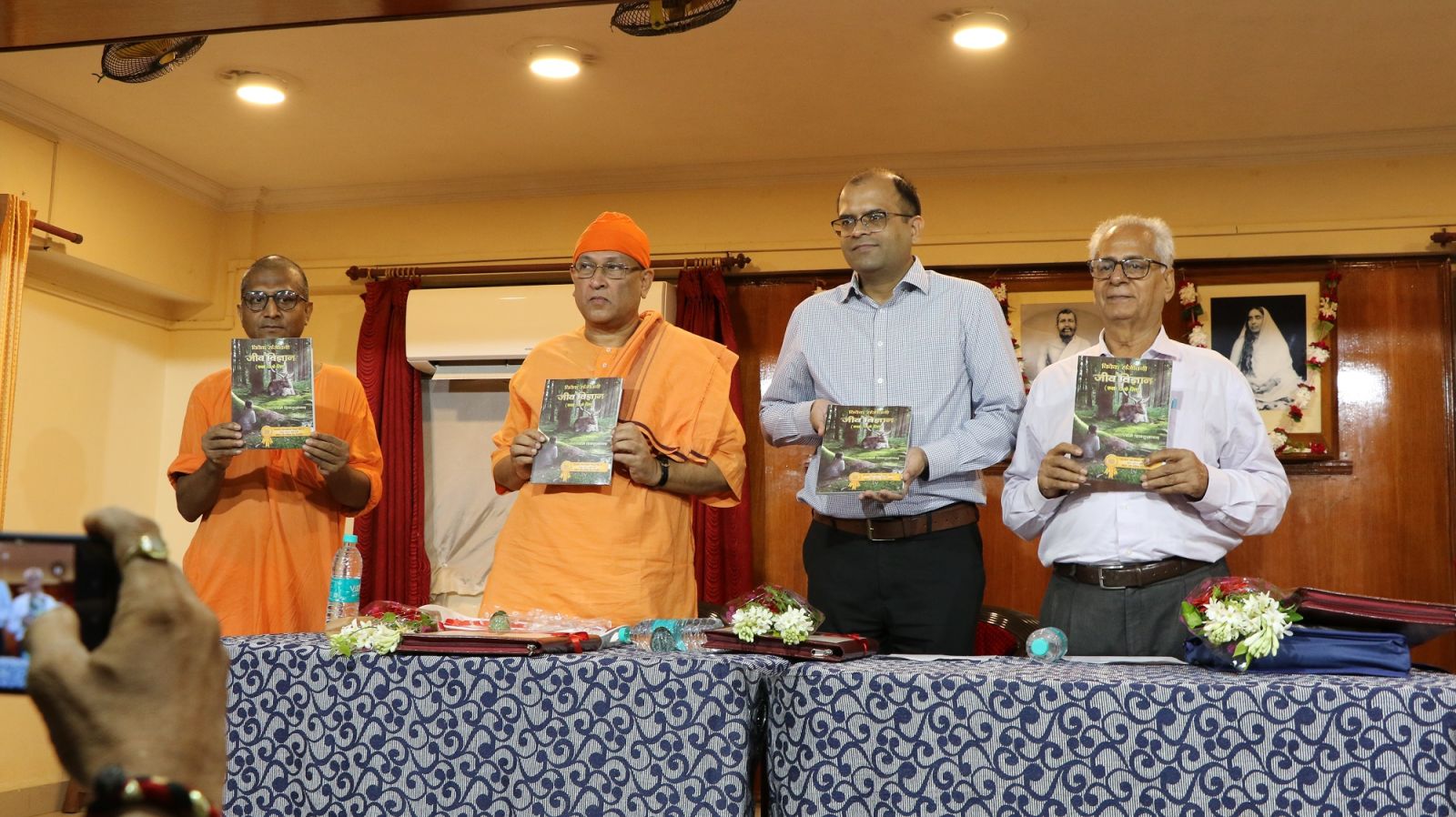
The pedagogical ideas behind publication of this book are based on research and experience to how children learn. Reading about and reflecting on these ideas will be useful for all teachers of science regardless of their teaching subjects.
8. Jivansudha (Value Education Programmes):
Inculcation of higher human values is one important objective of the Vivek Sanjivani programmes particularly in the youth. Values imbibed and practised in one’s own life makes life valuable and living joyous. To inculcate the attitude of practising higher ideals in life and to influence young minds right from the school days, Vivek Sanjivani has taken up this Jivansudha- value education programme, which used multimedia presentations to illustrate Ramakrishna-Vivekananda teachings for students and adults of various age groups. We have started Online Value Education classes for students to foster positive thinking. Sri Ramakrishna’s sayings are the inspirations for living daily life based on eternal values. Keeping this in mind, we have developed five films in Hindi and one film in Bangla based on stories told by Sri Ramakrishna. All the six films are dubbed in English. These films are shown from time to time in rural areas.
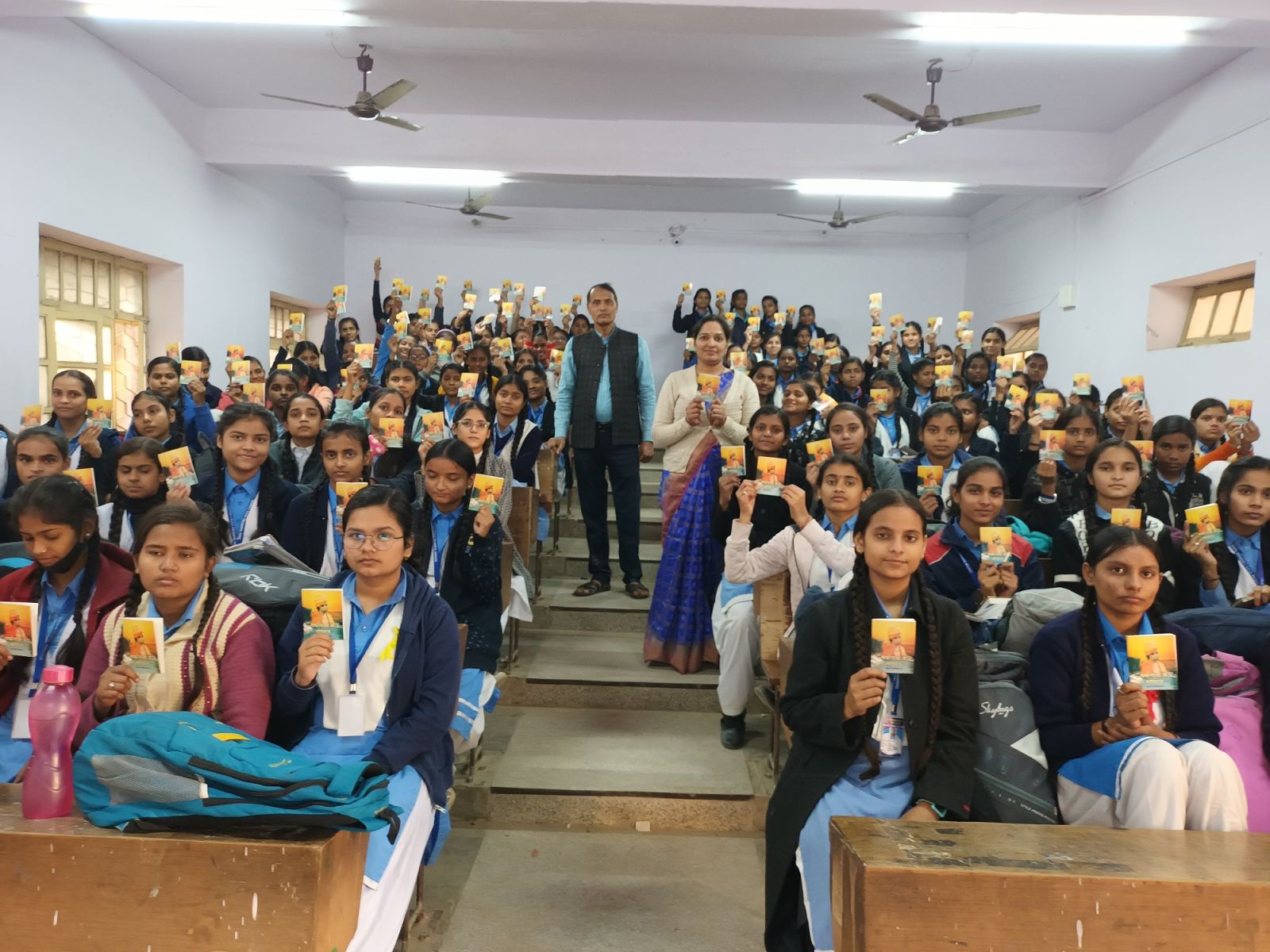
9. Teachers’ Workshops:
Educational expectations and curricula are constantly evolving. Advances in technology require new skills and offer new ways of learning, both in school and later in a complex and changeable socio-economic situations. Professional development helps teachers keep up with those changes and pass them on to their students. Professional development for one teacher benefits the entire school by bringing fresh ideas, insights, and enthusiasm to everyone.
Good teachers become great teachers by going beyond the call of duty and beyond the textbook. To do this, he or she must continue their education. Our workshops with teachers intended to provide the teachers professional help to equip them better motivated teachers. Our workshops also provide an opportunity to understand how to integrate technology into the classroom and how to make it cross curricular.
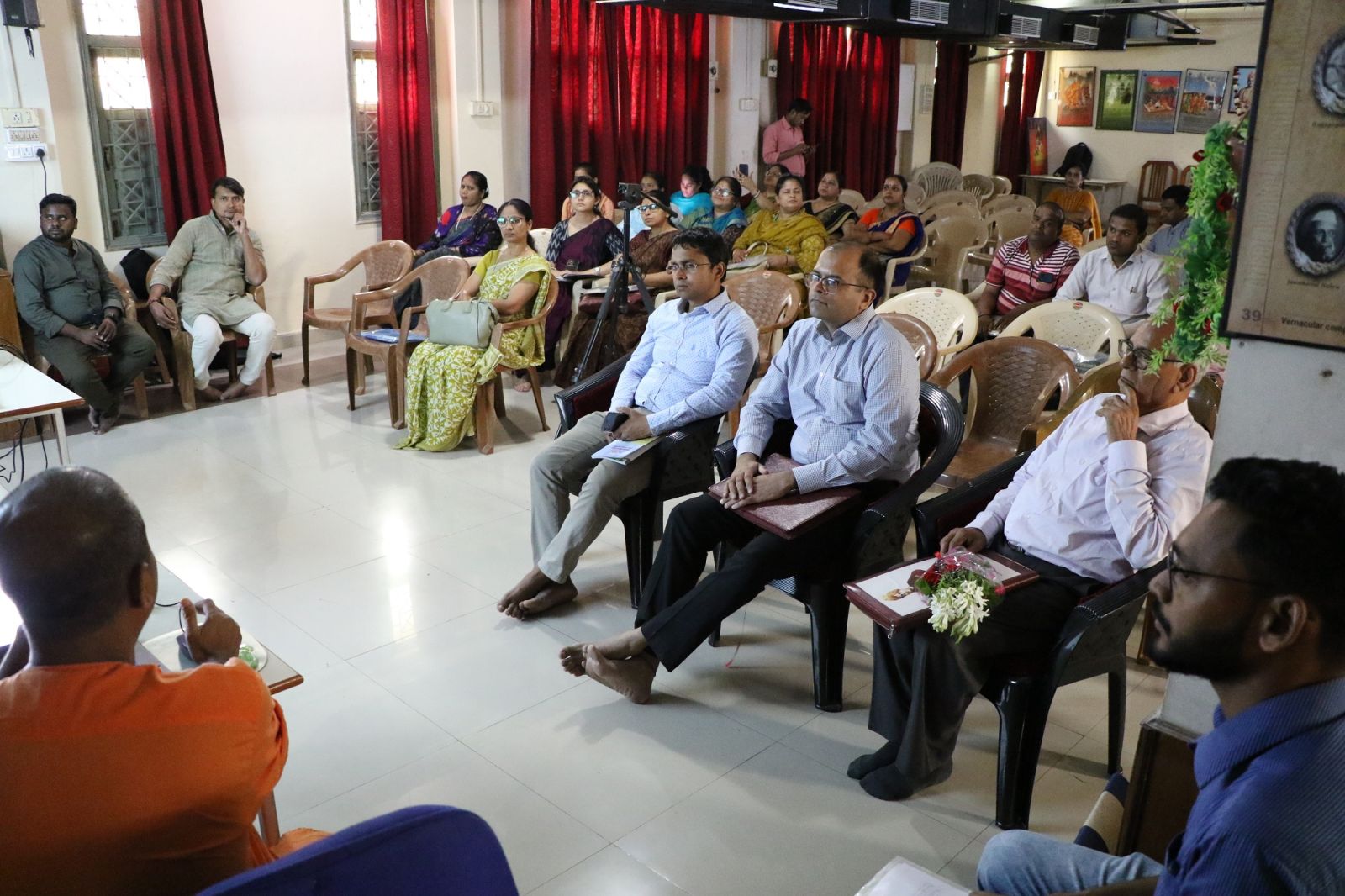
Vivek Sanjivani wants to promote excellence in concept-based and innovative teaching in all subjects including science, mathematics, and language. Implementing and supporting these types of teaching are rooted in engaging students to use core ideas of the topics and crosscutting concepts to explain phenomena or solve problems. To achieve it we conducted On-site and Online Teachers’ Workshops for 77 teachers from different schools on several occasions.
10. Students Orientation Programmes:
Our Students’ Orientation programmes have been started with several objectives like to encourage and enable the students to practise concentrate their minds, to focus in concept-based learning, to develop their personalities through their well-designed daily routines and to be ready to serve the nation as well as the humanity at large. We conducted this programme for 156 students in several sessions.
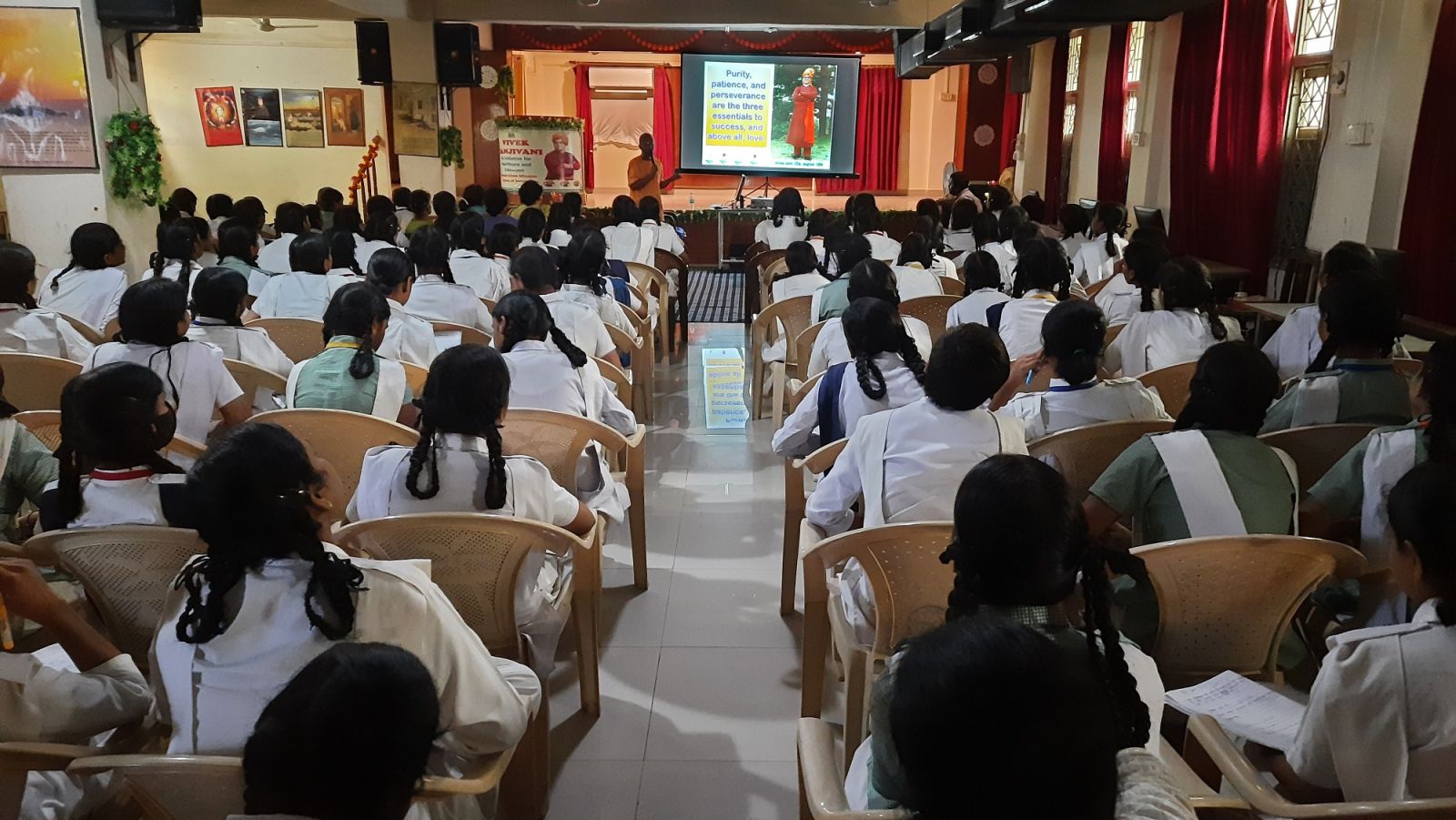
11. Creation of Book Banks in different Schools:
In some of the schools in Hindi medium schools in Varanasi having more than sixty percent of children live in low-income households. Most of these children have no age-appropriate books at home, and the classrooms and courses they attend are woefully under-resourced. Approximately two-thirds of these school children cannot afford to buy books at retail prices.
Vivek Sanjivani has pioneered groundbreaking channels to provide quality books and educational resources for free to schools for teachers and students.
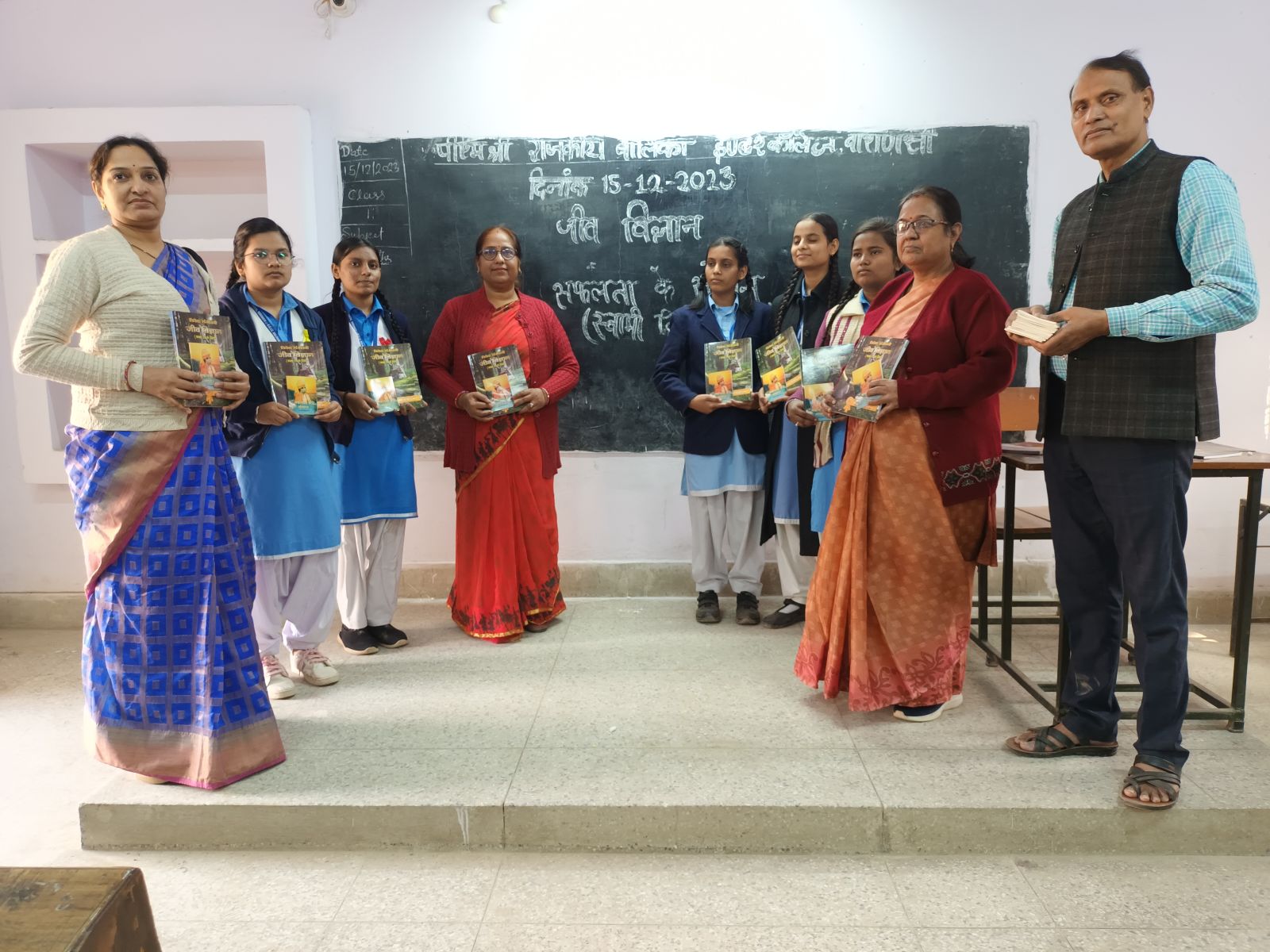
We provide teachers and school administrators with greater access to high-quality books that otherwise would not be available to them. Through Book Banks created by Vivek Sanjivani in different schools, educators can create enriched learning experiences for their students, and the children can enjoy an ongoing supply of wonderful quality books for their joyful learning. We created Book Banks in five schools for 1354 boys, 1077 girls and teaching staff.
12. Breaking the digital divide in the rural front:
Swami Vivekananda was a unique modern saint in India who emphasized on mass education and equated service of living beings, especially the poor and the downtrodden, with the worship of the Divine. He stated boldly: 'He who sees Shiva in the poor, in the weak and the diseased, really worships Shiva; and … with him Shiva is more pleased than with the man who sees Him only in temples.' It was Swami Vivekananda who coined the word daridra-narayana to refer to the poor and the afflicted. Vivek Sanjivani of Ramakrishna Mission Home of Service is making humble efforts to create an urge to learn and infuse in the children and youths the attitude and feeling for the poor and the underprivileged through Vivek Sanjivani’s Educational programmes.
(a) Knowledge as the catalyst:
The catalyst for change and empowerment is information and knowledge. Access to relevant information gives people opportunities to develop and better their lives. In turn, it helps family, society and the nation at large to strengthen the development process. Moreover, the ability to share information on a level playing field helps all to overcome barriers of isolation and encourages exchange and collaboration.
(b) Growing teledensity in India:
72% of India’s national population consists of people living in rural areas. However, it is a matter of pleasant wonder that the urban teledensity increased from 138.34 per cent at the end of December 2020 to 139.25 per cent at the end of January 2021, and rural teledensity increased from 59.05 per cent to 59.50 per cent during the same period. The telecom sector is trying to emphasize affordability, focusing particularly on rural India. This will enable the country to bridge the teledensity gap between rural and urban India. Vivek Sanjivani in its limited capacity providing the facilities of online classes even to remote rural areas.
13. Content Generation:
(a) For School Education: Content generation is one of the key factors in teaching science, Value Education and communicative English. The contents published in print media cannot be updated in a short span of time, but in the case of ICT-based content, easy and swift revision and updating are made possible through the circulation of content both to the learners and to other experts/professionals in the field of science teaching, Value Education and communicative English, who can make suggestions for updating information.
To promote the attitude of participative and interactive teaching and learning and to use ICT tools effectively to achieve development goals, the content should be tailored to the particular needs of the users and relevant to the specific cultures and languages of targeted communities. This is a special need of the hour.
The contents of the multimedia presentations of different science subjects were mostly developed in the local language of Hindi in order to fulfil the local need in Uttar Pradesh and Uttarakhand. Sometimes video clippings shown during the lessons were in English to help the students strengthen their command of that language while learning science subjects in an easy and entertaining manner. The content of the lessons was developed more or less according to the syllabus of the State Board or universities. Care was also taken to motivate all categories of students and to develop in them an inner urge to learn more and to grasp the ideas presented after careful thought.
(b) Development of Multimedia-based Study Materials with Special Focus on Higher Values of Life: Multimedia based study materials for different science subjects, communicative English, etc., are being prepared and constantly upgraded keeping in view the value education aspect by incorporating positive ideas based on Swamiji’s teachings. Swamiji’s ideas on various subjects and various aspects of life are being included as integral parts of regular class lessons to increase the awareness of the students as well as to familiarize them with Swamiji’s unique insights and ideas in Spiritual unfoldment and in the areas of science. To bring the quality of the study materials at par similar materials at the international level, many internationally reputed books, articles have been consulted. To foster the spirit of scientific enquiry in the students, many visual clips of laboratory experiments and animations of different processes or theories have been incorporated within the study materials. We have presented these study materials to a large cross-section of teachers and discussed the contents with them. Experienced teachers of Ramakrishna Mission schools and other institutions have been consulted and their views incorporated in these study materials thus prepared.
14. Health Education Study Materials Development:
We have published a translated book in Hindi ‘Schizophrenia- A Manual To work with Schizophrenic people and their families, and a booklet in Hindi ‘Janman Swasthya’ - which can be used as a supportive document for Middle-Level Health workers engaged in Mental healthcare. One video in Hindi on Schizophrenia has been developed to create awareness about Severe Mental Disorders among the vast majority of rural and urban people.
15. Health Education Film Development:
We have developed the video ‘Amulya Jeevan’, a cancer awareness film in Hindi and another ‘Nishabd Ghatak’, a film based on respiratory problems due to indoor pollution in rural areas in Hindi to create awareness among the vast majority of rural and urban people. Several other Health educational videos have been developed and are regularly shown in the villages in order to provide health education to village people, young and old both.
16. Empowering Rural Women (ERW):
We have provided financial support to some of the ladies of the Lohara village to start some business of their own. We have regular discussions with the members of the women groups about several rights given to them by the constitution. We discuss Microfinance in the groups to work together and save money and use it for other purposes like raising animals, starting small scale businesses - weaving, fishery etc.




